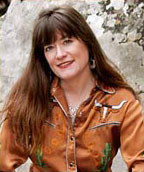


Here is a review from The Dallas Morning News for the book Public Cowboy No. 1: The Life and Times of Gene Autry by Holly George-Warren.
Autry, the Common Man's Hero
By Byan Woolley
May 27, 2007

In 1943 or '44, when I was a first-grader, a rodeo came to Dublin, Texas, and the Woolley family, who never went anywhere, used precious rationed gasoline to go see it. For Gene Autry was to be there.
He led the rodeo parade down Dublin's main street. He was riding Champion, of course, who was decked in his famous silver-mounted saddle and bridle. But Gene was wearing the uniform of a sergeant in the U.S. Army Air Corps. At age 34, he had joined up. Soon he would be ferrying planes from American air bases to war fronts in Europe and Asia.
That evening, Gene galloped Champion into the arena and made a spectacular dismount. He was still in uniform. A cowboy handed him a guitar and he sang. I remember "You Are My Sunshine," which was a big hit from before the war. When the rodeo ended, Gene was standing near the gate, smiling and shaking hands with the departing crowd. My father led me up to meet him.
I, a skinny, towheaded 6-year-old in bib overalls, stood too awestruck to speak. Gene bent almost to my level and took my hand and said I was a fine-looking young man.
Remembering this more than 60 years later, I still feel the awe. My encounter with Gene was an indelible moment of my life.
He was rural America's No. 1. hero, and most of America was rural back then. We worked little farms and ranches and bought our coffee and flour in tiny villages. From 1934 to 1953, through grueling years of drought, dust, foreclosure, poverty and hot and cold war, Gene was on the screen fighting for the underdog (us) against thieves, murderers, swindlers and greasy capitalists. Contrary to our own experience, Gene always won.
His Westerns brought us action, music, humor and hope. On radio and records (for those who could afford them) his warm, mellow voice sang of a romantic West so different from our own grubby homesteads. And Gene showed up in person in places that other Hollywood stars never did, such as Dublin, Texas.
He was what The Saturday Evening Post said he was: "a combination of Sherlock Holmes in a 10-gallon hat, Don Quixote with common sense, and Bing Crosby on horseback."
At last, in the centennial year of Gene's birth, Holly George-Warren gives us Public Cowboy No. 1, his first serious, full-length biography. There isn't likely to be another for a long time, so it's fortunate that Ms. George-Warren's is a good one.
It's solid and detailed, and it provides plenty of warts-and-all gossip to spice its too-numerous accounts of recording and movie contract negotiations, real estate deals and product licensing agreements. Gene, in addition to being the wholesome children's hero he played on the screen, apparently slept with nearly all his leading ladies and, toward the end of his performing career, was such a serious drunk that he couldn't stay on his horse.
Nevertheless, only he has earned five stars on the Hollywood Walk of Fame, for film, recordings, television, radio and live performances. Fortune magazine named him "Hollywood's #1 Businessman." He gave more than $180 million to charities. He visited children's hospitals and orphanages in every town where he performed and was a soft touch for down-and-out show people. He was a good man with weaknesses.
Gene's empathy for the downtrodden no doubt grew from his own poorer-than-dirt childhood in North Texas and southern Oklahoma. He was born Orvon Grover Autry near tiny Tioga in Grayson County, Texas, in 1907. His father was a petty criminal and ne'er-do-well drifter who was too popular with women. Gene's mother, abandoned to rear her brood alone, died young of pellagra, a disease caused by poor diet. For most of their lives, Gene was the sole support of his mother and younger siblings.
He left home at 17 and made a career as a Frisco Railroad telegrapher. With other Frisco employees, he wrote songs and sang at community events and little radio stations. Eventually he graduated to New York recording studios, then to Hollywood.
In 1936 he filmed one of his better movies, The Big Show, at the Texas Centennial celebration at Fair Park. He served part of his Air Corps hitch with the 91st Ferrying Squadron at Love Field. He sang on radio shows in Dallas and Fort Worth. His music inspired and influenced the likes of Lead Belly, Willie Nelson and Waylon Jennings. But his fame spread far beyond the prairie. When he visited Britain in 1939, writes Ms. George-Warren, "the hysteria was equivalent to the Beatles' first trip to America three decades later."
Gene never considered himself a real actor, and he wasn't. But he worked hard and made everything seem casual and easy, and he could sing, and we loved him. A movie producer once explained the secret of his success: "Gene does what he does, and that's all he can do, and that's what they like."
It could have been his epitaph. On Oct. 2, 1998, he died in his sleep. He was 91.